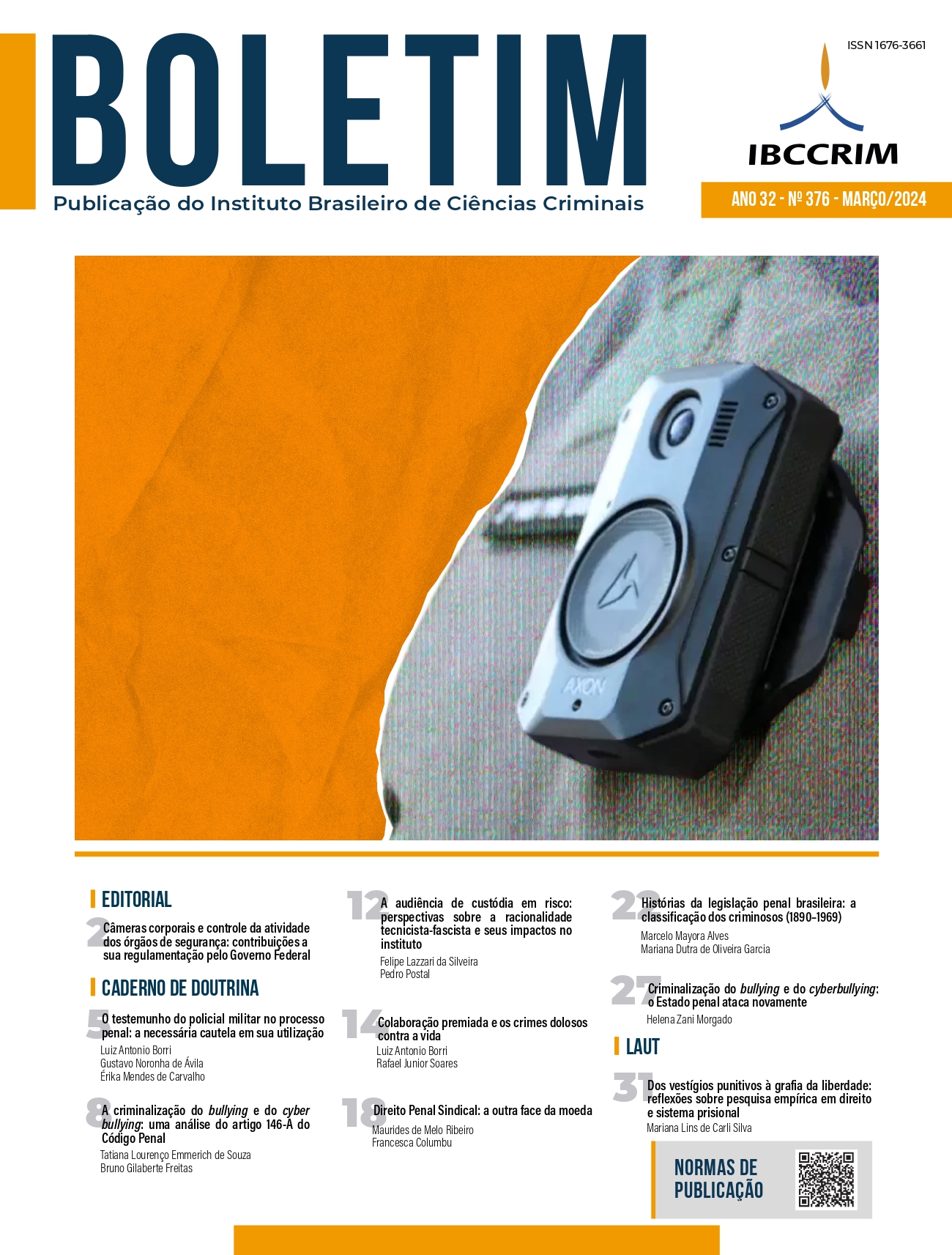Union criminal law: the other side of the coin
Views: 282DOI:
https://doi.org/10.5281/zenodo.10687489Keywords:
Criminal trade union law , Trade union right, Criminalization of social/union movements, Countermajoritarian criminal lawAbstract
This essay intends to bring to the legal debate, the hypothesis of a specialty that has been forgotten by the doctrine and legal operators of criminal law. It is a field of the renowned economic criminal law, but which encompasses counter-majoritarian themes. If on one hand we have corporate criminal law that has been systematized over the last few decades, and, moreover, has been treated with leniency; at this stage, we have the use of criminal law as an instrument of intimidation and repression of union activities. Therefore, the guarantees and immunities of the union mandate must be reviewed. On the other hand, there are countless collective rights that have historically gained criminal relevance, are today protected by the legal system, and have profound effects and consequences on work relationships. Unions and trade unions must also be aware of these new/old issues such as racism, discriminatory issues against women and LGBTQIA+ communities, crimes against children and the environment, and countless other topics of interest to all young people that have seriously repercussions now at days and are of interest in this brief article, in labor relations and the exercise of the union mandate. That said, this essay proposes a debate on the field that we currently call trade union criminal law.
Downloads
Publication Facts
Reviewer profiles N/A
Author statements
- Academic society
- Instituto Brasileiro de Ciências Criminais
- Publisher
- IBCCRIM
References
BRASIL. [Constituição (1988)]. Constituição da República Federativa do Brasil. Brasília, DF: Senado Federal, 1988. Disponível em: https://www.planalto.gov.br/ccivil_03/constituicao/constituicao.htm. Acesso em: 19 fev. 2024.
BRASIL. Decreto-Lei nº 5.452, de 1º de maio de 1943. Aprova a Consolidação das Leis do Trabalho. Rio de Janeiro: Presidência da República, 1943. Disponível em: https://www.planalto.gov.br/ccivil_03/decreto-lei/del5452.htm. Acesso em: 19 fev. 2024.
ORGANIZAÇÃO INTERNACIONAL DO TRABALHO. Convenção 87: Relativa à Liberdade Sindical e à Proteção do Direito de Sindicalização. 22 de junho de 1948. Disponível em: https://www.ilo.org/brasilia/convencoes/WCMS_239608/lang--pt/index.htm. Acesso em: 19 fev. 2024.
ORGANIZAÇÃO INTERNACIONAL DO TRABALHO. Convenção 98: Direito de Sindicalização e de Negociação Coletiva. 18 de novembro de 1952. Disponível em: https://www.ilo.org/brasilia/convencoes/WCMS_235188/lang--pt/index.htm. Acesso em: 19 fev. 2024.
DELGADO, Mauricio Godinho. Direito coletivo do trabalho. 4. ed. São Paulo: LTr, 2011.
FELICIANO, Guilherme Guimarães. Refundando o Direito Penal do trabalho: primeiras aproximações. Revista da Faculdade de Direito da Universidade de São Paulo, São Paulo, v. 104, p. 339-375, jan./dez. 2009. Disponível em: https://www.revistas.usp.br/rfdusp/article/view/67861/70469. Acesso em: 19 fev. 2024.
GALLART FOLCH, Alejandro. El sindicalismo como fenómeno social y como problema jurídico. Buenos Aires: Zavalia, 1957.
OLIVEIRA NETO, Alberto Emiliano et al. Atos antissindicais: manual de atuação. Brasília: Ministério Público do Trabalho, Conalis, 2021. Disponível em: https://mpt.mp.br/pgt/publicacoes/manuais/atos-antissindicais-manual-de-atuacao/@@display-file/arquivo_pdf. Acesso em: 19 fev. 2024.
SILVA, Walküre Lopes Ribeiro da; LIMA, Firmino Alves. Repressão penal dos atos antissindicais. Revista do Tribunal Regional do Trabalho da 15ª Região, n. 37, 2010. Disponível em: https://hdl.handle.net/20.500.12178/104691. Acesso em: 19 fev. 2024.
URIARTE, Oscar Ermida. La proteción contra los actos antisindicales. Montevidéu: FCU, 1987.
WACQUANT, Loïc. Punir os pobres: a nova gestão da miséria nos Estados Unidos. 3. ed. São Paulo: Revan, 1969.
Downloads
Published
How to Cite
Issue
Section
License
Copyright of published articles belongs to the author, but with journal rights over the first publication and respecting the one-year exclusivity period. Authors may only use the same results in other publications by clearly indicating this journal as the medium of the original publication. If there is no such indication, it will be considered a situation of self-plagiarism.
Therefore, the reproduction, total or partial, of the articles published here is subject to the express mention of the origin of its publication in this journal, citing the volume and number of this publication. For legal purposes, the source of the original publication must be consigned, in addition to the DOI link for cross-reference (if any).


 Português (Brasil)
Português (Brasil)
 English
English
 Español (España)
Español (España)






